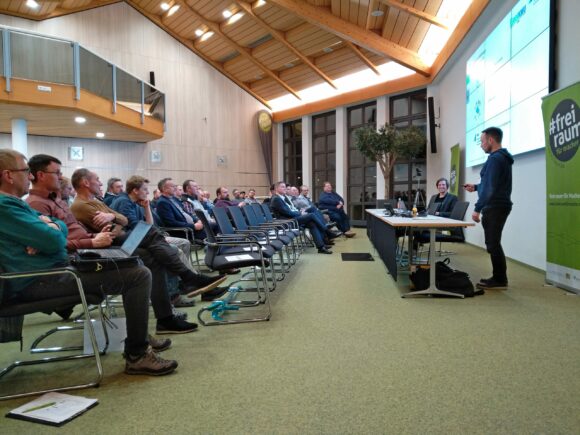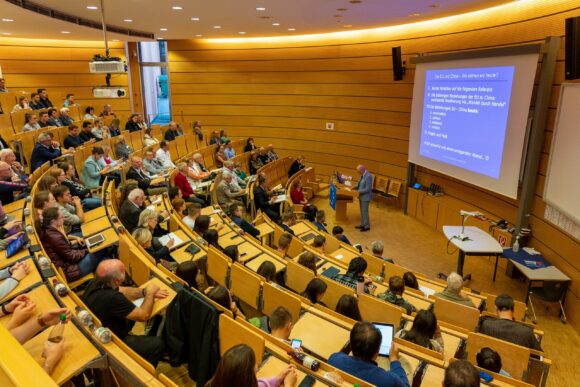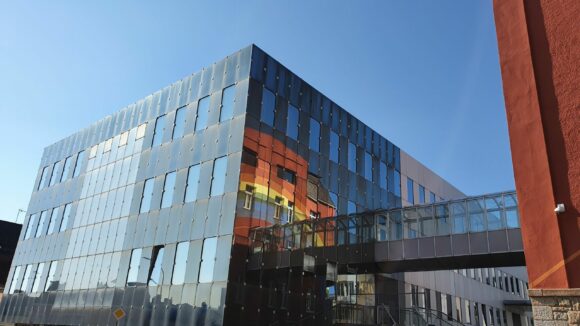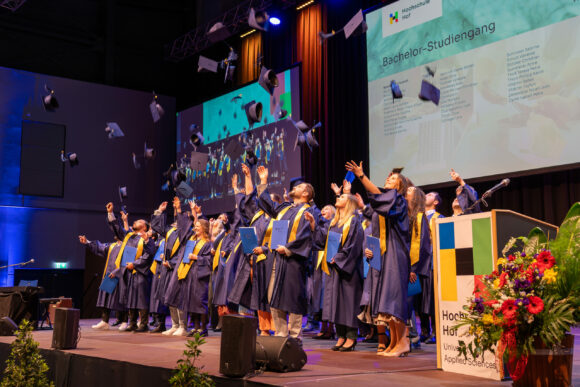With around 170 participants, the 7th Europe Forum was the best-attended Europe Forum to date. With the choice of topics, organizer Prof. Peter Schäfer proved a good hand. The title “Peacekeeping in Europe and Cold War 2.0? ” brought together an exciting panel.
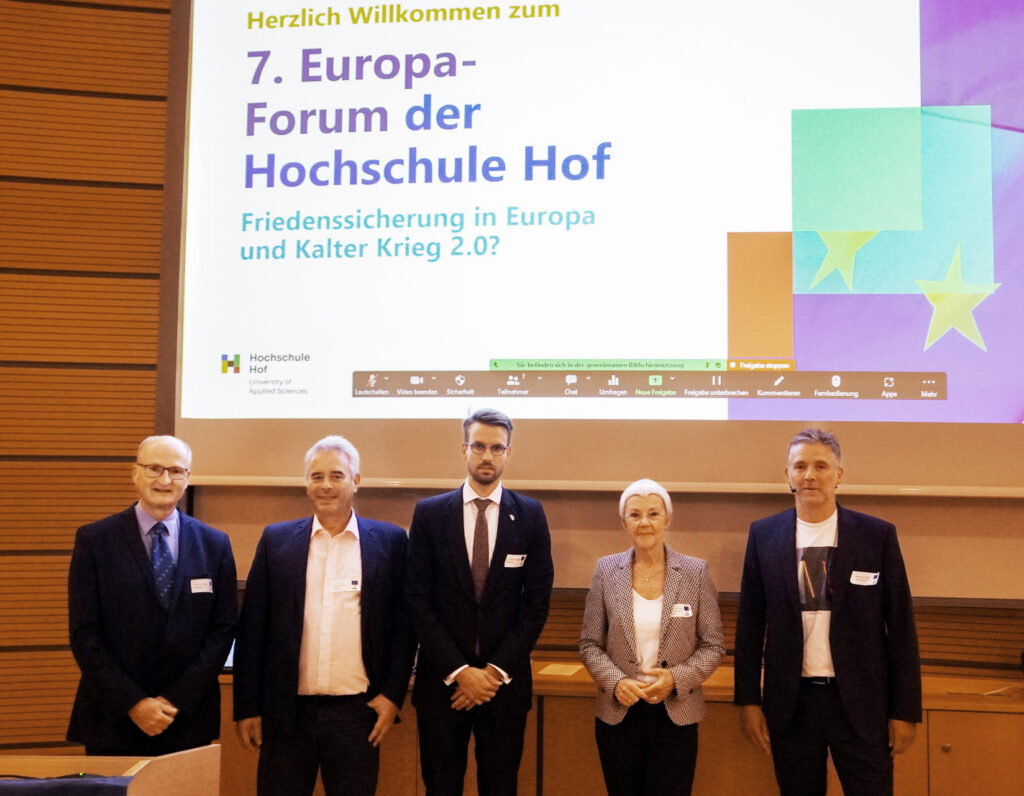
The welcome address by Valentin Plenk, Vice President Research and Development, provided an overview of the connection between the university and the EU as an introduction: 7 million euros have so far flowed from EU pots into the research of the four institutes. In addition, around four million euros have flowed for the Erasmus+ exchange program. And, of course, there are also new projects – fed by the European Social Fund – that transfer knowledge from the university to the region (“campuls-digital” reported).
“You can’t say the EU is far away for us!”
Prof. Dr.-Ing. Valentin Plenk, Vice President Research & Development at Hof University of Applied Sciences
Then it was on to the topic: “So far, I have introduced our Europe Forum with topics such as roaming and the benefits of SEPA credit transfers,” said the vice president. This year’s forum, on the other hand, would be about a war that prevents people from surviving.
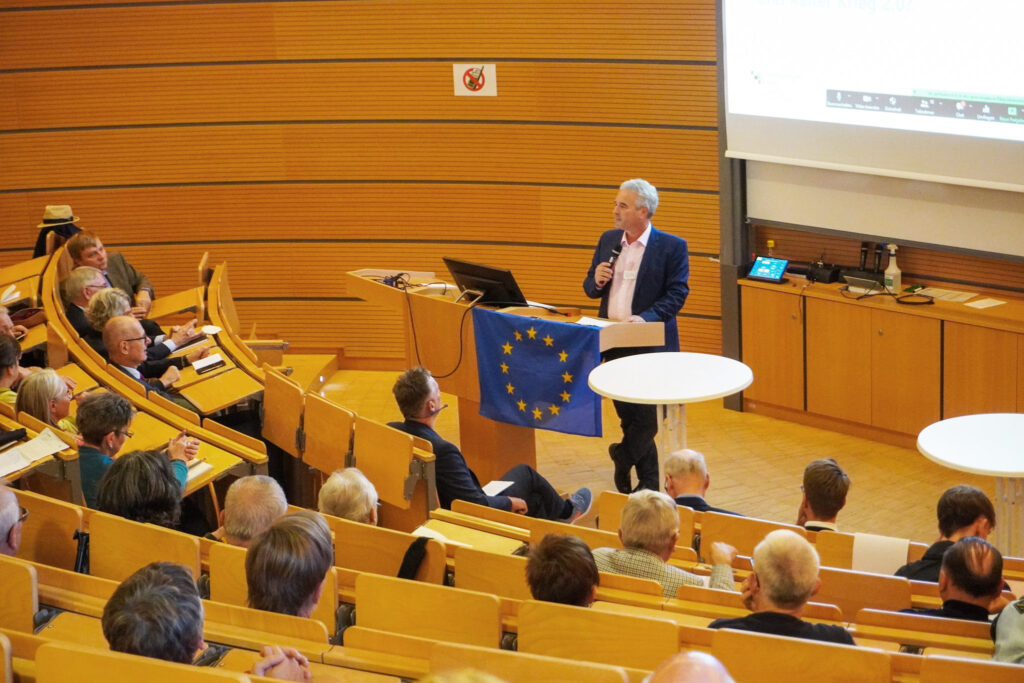
As the venue for discussion and transfer that the university is, the evening featured four perspectives on the Ukraine war:
Brigadier General Dr. Christian Freuding, Head of the Crisis Staff Ukraine at the German Ministry of Defense, joined online and brought insights into the military perspective. At the same time, he answered interested questions: 3,000 soldiers are on the move in Ukraine every day. Germany, together with other EU partners, was supplying equipment such as vehicles and means of communication as well as training units for the Ukrainian army: In addition to “pushing steel across the border”, there was also the moral obligation to train soldiers. There is also a civilian mission to provide political advice in order to achieve standards that would make EU accession possible.
Putin is taken very seriously, but this should not lead to paralysis, the general added. He assessed a nuclear war as unlikely. Asked whether a diplomatic solution would not be better than letting the war last longer, the speaker said that the war could end immediately if Russia withdrew its forces from the territory of Ukraine. And the EU? Can it live up to its goals?
Unity and resolve are more manifest than ever.”
Brigadier General Dr. Christian Freuding
Political will is needed to support Ukraine, he said, and in the entire history of the EU there has never been unity like there is now. To the final question about the future and whether Russia might soon withdraw, he replied, “My wishful thinking is: the war should end, but at the moment it’s not likely to.”
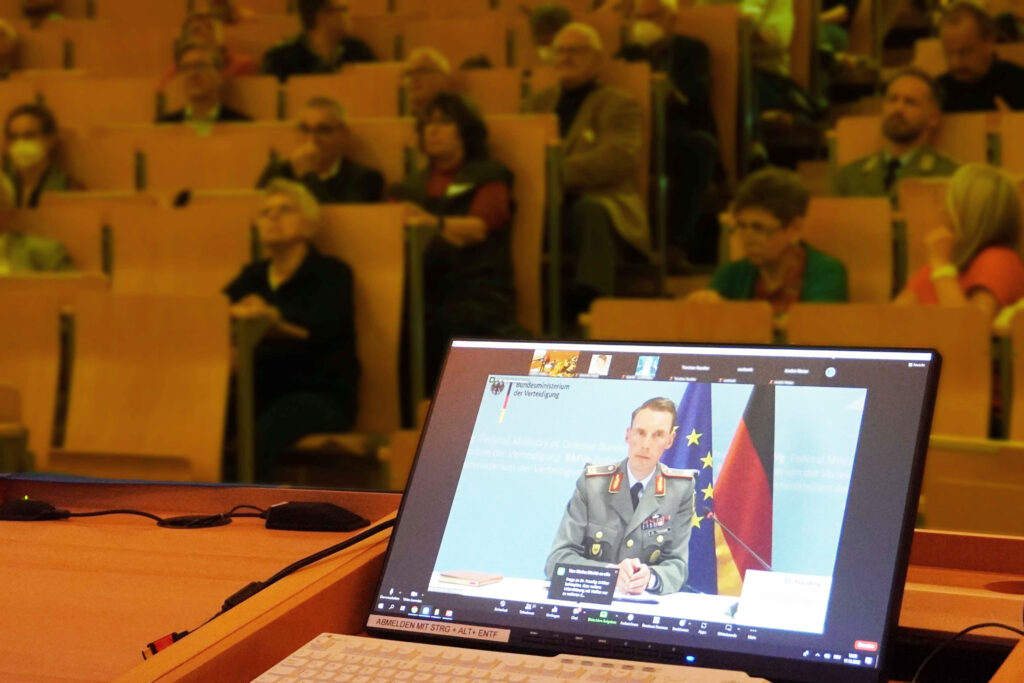
Professor Dr. Peter Schäfer, founder of the Europa-Forums, brought a historical perspective to the understanding of the EU’s peace mission: “A full belly does not shoot,” he introduced his overview. Peace through prosperity and cooperation is one of the achievements of the EU, he said, which takes effect in the abstract and the concrete areas of everyday life of citizens: anti-discrimination, for example, which can be understood as a social peace policy, hydrogen as a subsidized source of energy, up to unified charging cables, Peter Schäfer said.
The war of aggression on Ukraine in February 2022 has now changed the perspective: “Absolute security does not exist,” said the professor of EU law – but what can the EU now do concretely? It could set up new command structures, such as a general staff in Brussels. It could continue to form multinational units in the military field, establish a joint procurement system and, last but not least, strive for energy self-sufficiency in Europe – for example, by broadening the supply chains.
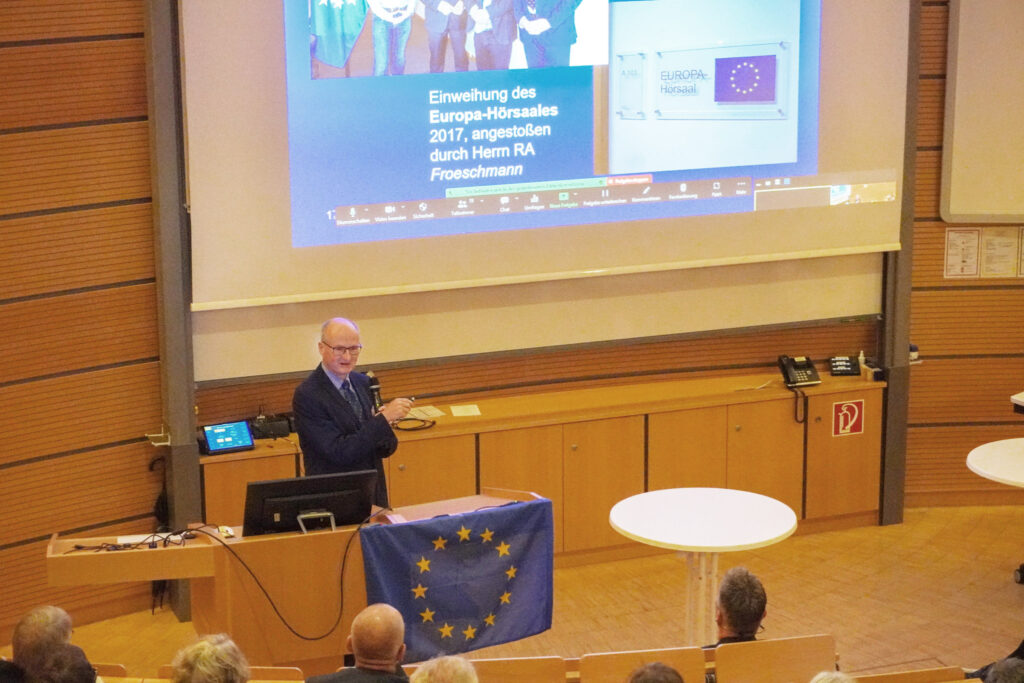
Peter Schäfer was followed by the press spokesman of the EU Commission in Munich, Dr. Renke Deckarm. His assessment: The war in Ukraine is not a regional conflict from which the EU can stay out of, because the war is fought in Ukraine, but behind it the values of the EU are fought over. Specifically, he mentioned human rights, democracy, freedom, and equality. From day one, he said, the EU has provided full support to Ukraine in the form of budgetary resources for the reception of refugees and arms supplies.
Furthermore, a more subtle weapon in war is the word, he said. In the information war, there are some common narratives, the press secretary detailed
- Ukraine itself, or the West, caused the attack. Western elites controlled Ukraine and geopolitically surrounded Russia. The counter-argument: It is a perpetrator-victim reversal, which ignores the free elections and political successes in Ukraine.
- Denazification: a justification used by Putin only at the beginning of the war: Ukrainian institutions and society were riddled with nationalists. At the core of this claim is the Azov regiment, a volunteer battalion made up of members of far-right groups, and the fact that far-right extremists were also involved in the Maidan protests.
- Sanctions hit Europe harder than Russia: According to Deckarm, however, the EU sanctions are designed in such a way that they hit Russia economically harder than the EU states. There are no official figures from Russia for reconciliation.
- The food shortage due to failed grain deliveries to Africa is due to a deliberate shortage on the part of Ukraine. This is simply wrong.
Finally, the recommendation of the platform EU vs DIsinfo followed. In the discussion round with the audience, Dr. Deckarm emphasized Ukraine’s freedom to choose its alliances.
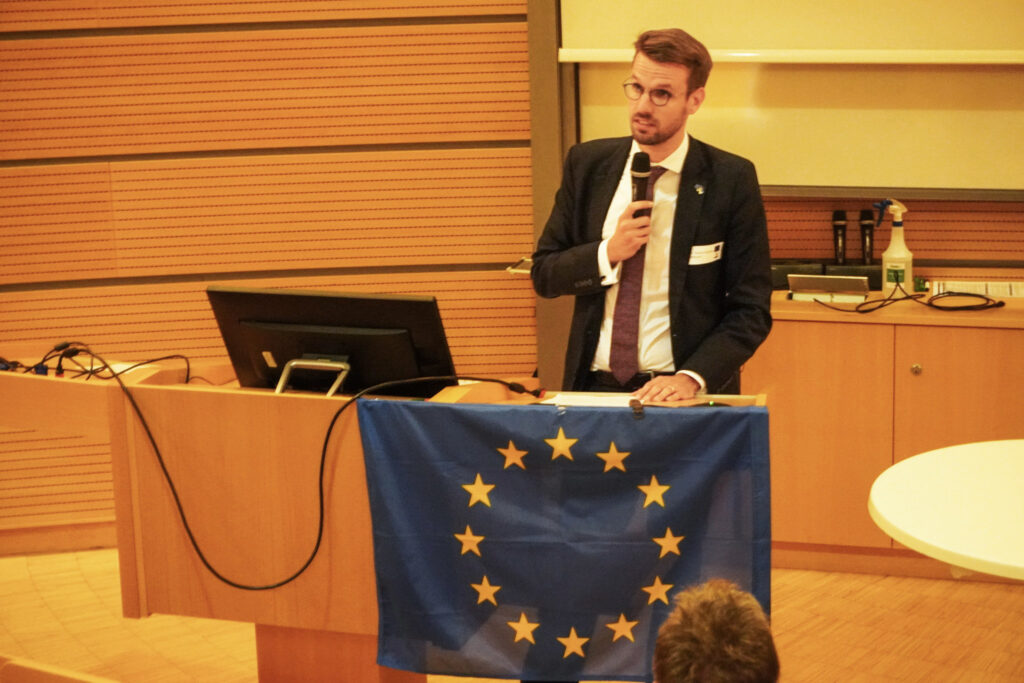
As the last speaker, Professor Gabriele Krone-Schmalz came on stage and brought her perspective on Russia.
“We are in a new ice age, which I would never have suspected in this way,” she jumped in and, in line with the approach of understanding the present with a view to the past, led to a recapitulation of her previous position, according to which the threat on Russia’s borders would have led to an attack. But the attack would be contrary to Russian interests, both political and economic. The popular explanation that Putin was sick or crazy, she said, seemed too one-dimensional as an explanation.
Instead, she offered a look at the social and political developments in Russia in recent decades: From confrontational thinking to the umbrella of a European security architecture adapted to the changes. The accession of many former Eastern bloc countries to NATO was driven by experiences and fears from Soviet times and had oriented the defense alliance more anti-Russian, for example via missile bases in Poland and Romania. This, he said, had reached a Russian pain threshold in aligning Ukraine with the West. Gabriele Krone-Schmalz added past statements and positions, for example, according to which Ukrainian President Selenskyj could still imagine a neutrally oriented Ukraine at the beginning of 2022. The Russian dual strategy of deterrence and dialogue instead of security and détente, the journalist argued, was born out of weakness and fear, not strength.
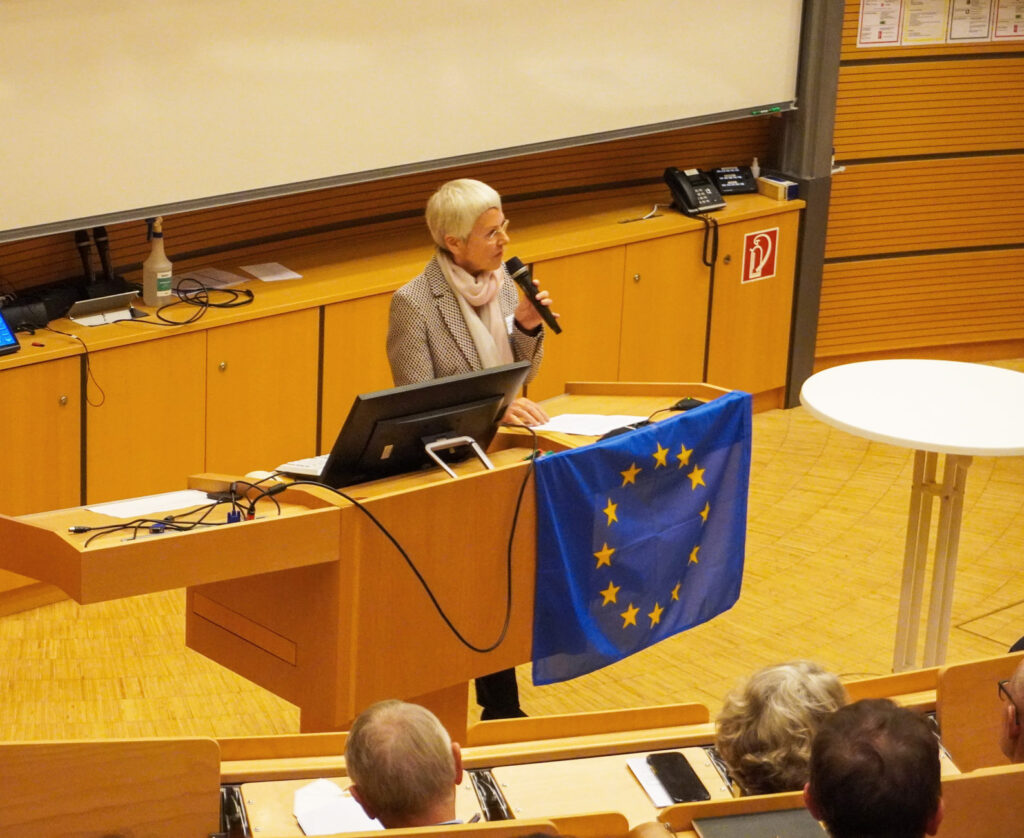
Prof. Dr. Peter Schäfer, founder of the Europaforum, expressed his satisfaction with the event afterwards
“I am very pleased that the topic of this year’s forum proved to be so close to the people. Events like our Europe Forum also have a venting function, especially in uncertain times: the citizens and audience should be able to ‘let off steam’ for once.”
Prof. Dr. Peter Schäfer, Professor of EU Law
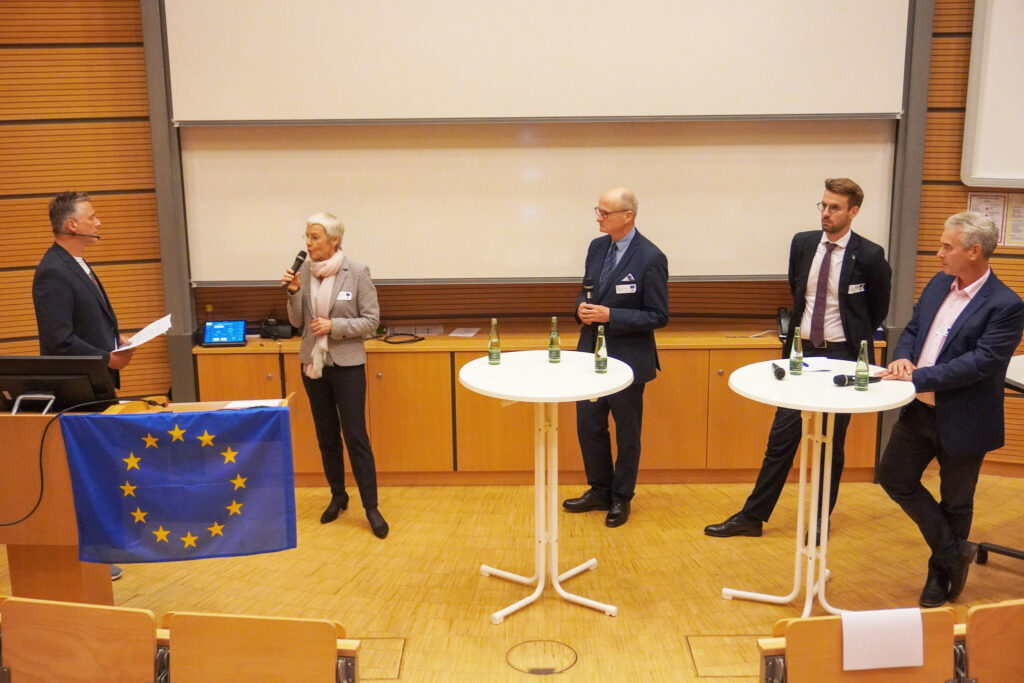
The moderator Matthias Will, who led the discussion round in a sovereign manner, also agreed with this conclusion
I was very pleased with the evening in view of the top-class line-up and the overwhelming response. An extraordinary and memorable event for all!”
Matthias Will, moderator




